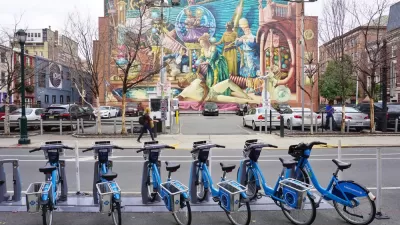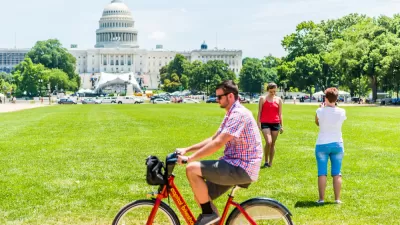Dockless bikes offer the unexpected and help users navigate and understand the urban environment in new and different ways.

In an excerpt from the new book The Urban Improvise: Improvisation-Based Design for Hybrid Cities, Kristian Kloeckl reflects on the role of dockless bike systems as part of the urban landscape. He looks at the changes in bikeshare program from Amsterdam’s White Bicycle Plan in the 1960s to today’s digital and highly connected networks.
Dockless bikes offer the openness and freedom to make new and more spontaneous travel decisions, says Kloeckl. "When you see a bike in plain sight or virtually on a digital map, you walk up to it, unlock it with your smartphone, and start riding it, to then leave it parked at any spot. It is a strength of the system that it is so inviting and easily accessible; people come up with new ways of integrating these bikes into their daily routines that they themselves did not consider before."
Dockless bikesharing is not without its issues — missing and abandoned bikes or bikes left outside of the system’s boundaries, for example. But this uncertainty is also what fuels the possibilities, argues Kloeckl.
"The dockless bike-sharing system is in constant flux. Bikes are parked in different locations all the time, and the system, in this way, is capable of adapting to changing conditions of traffic, housing, residency, and so on. Precisely because there are no predetermined docking stations, the parked bike locations remain relevant in the context of constantly changing urban conditions, as the locations are an expression of actual use," adds Kloeckl.
FULL STORY: Embracing the Improvisation of Dockless Bike-Share

Maui's Vacation Rental Debate Turns Ugly
Verbal attacks, misinformation campaigns and fistfights plague a high-stakes debate to convert thousands of vacation rentals into long-term housing.

Planetizen Federal Action Tracker
A weekly monitor of how Trump’s orders and actions are impacting planners and planning in America.

In Urban Planning, AI Prompting Could be the New Design Thinking
Creativity has long been key to great urban design. What if we see AI as our new creative partner?

King County Supportive Housing Program Offers Hope for Unhoused Residents
The county is taking a ‘Housing First’ approach that prioritizes getting people into housing, then offering wraparound supportive services.

Researchers Use AI to Get Clearer Picture of US Housing
Analysts are using artificial intelligence to supercharge their research by allowing them to comb through data faster. Though these AI tools can be error prone, they save time and housing researchers are optimistic about the future.

Making Shared Micromobility More Inclusive
Cities and shared mobility system operators can do more to include people with disabilities in planning and operations, per a new report.
Urban Design for Planners 1: Software Tools
This six-course series explores essential urban design concepts using open source software and equips planners with the tools they need to participate fully in the urban design process.
Planning for Universal Design
Learn the tools for implementing Universal Design in planning regulations.
planning NEXT
Appalachian Highlands Housing Partners
Mpact (founded as Rail~Volution)
City of Camden Redevelopment Agency
City of Astoria
City of Portland
City of Laramie




























